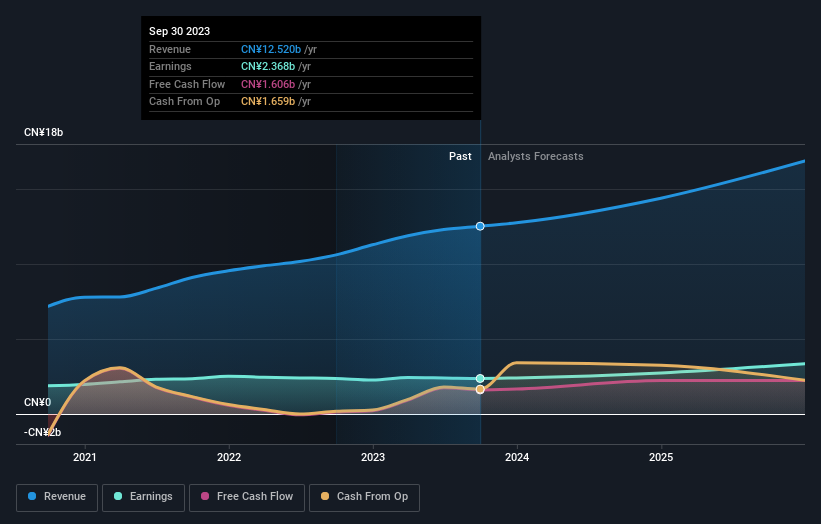With 43% ownership, FinVolution Group (NYSE:FINV) insiders have a lot riding on the company's future
Key Insights
Insiders appear to have a vested interest in FinVolution Group's growth, as seen by their sizeable ownership
53% of the business is held by the top 5 shareholders
If you want to know who really controls FinVolution Group (NYSE:FINV), then you'll have to look at the makeup of its share registry. We can see that individual insiders own the lion's share in the company with 43% ownership. In other words, the group stands to gain the most (or lose the most) from their investment into the company.
So, insiders of FinVolution Group have a lot at stake and every decision they make on the company’s future is important to them from a financial point of view.
In the chart below, we zoom in on the different ownership groups of FinVolution Group.
View our latest analysis for FinVolution Group
What Does The Institutional Ownership Tell Us About FinVolution Group?
Institutional investors commonly compare their own returns to the returns of a commonly followed index. So they generally do consider buying larger companies that are included in the relevant benchmark index.
As you can see, institutional investors have a fair amount of stake in FinVolution Group. This implies the analysts working for those institutions have looked at the stock and they like it. But just like anyone else, they could be wrong. If multiple institutions change their view on a stock at the same time, you could see the share price drop fast. It's therefore worth looking at FinVolution Group's earnings history below. Of course, the future is what really matters.
Hedge funds don't have many shares in FinVolution Group. Our data suggests that Shaofeng Gu, who is also the company's Top Key Executive, holds the most number of shares at 30%. When an insider holds a sizeable amount of a company's stock, investors consider it as a positive sign because it suggests that insiders are willing to have their wealth tied up in the future of the company. Allspring Global Investments, LLC is the second largest shareholder owning 6.7% of common stock, and Jun Zhang holds about 6.3% of the company stock. Interestingly, the third-largest shareholder, Jun Zhang is also a Member of the Board of Directors, again, indicating strong insider ownership amongst the company's top shareholders. Furthermore, CEO Tiezheng Li is the owner of 2.5% of the company's shares.
Our research also brought to light the fact that roughly 53% of the company is controlled by the top 5 shareholders suggesting that these owners wield significant influence on the business.
Researching institutional ownership is a good way to gauge and filter a stock's expected performance. The same can be achieved by studying analyst sentiments. There are plenty of analysts covering the stock, so it might be worth seeing what they are forecasting, too.
Insider Ownership Of FinVolution Group
The definition of an insider can differ slightly between different countries, but members of the board of directors always count. Company management run the business, but the CEO will answer to the board, even if he or she is a member of it.
Most consider insider ownership a positive because it can indicate the board is well aligned with other shareholders. However, on some occasions too much power is concentrated within this group.
Our information suggests that insiders maintain a significant holding in FinVolution Group. Insiders own US$634m worth of shares in the US$1.5b company. That's quite meaningful. Most would be pleased to see the board is investing alongside them. You may wish to access this free chart showing recent trading by insiders.
General Public Ownership
The general public-- including retail investors -- own 23% stake in the company, and hence can't easily be ignored. While this group can't necessarily call the shots, it can certainly have a real influence on how the company is run.
Next Steps:
It's always worth thinking about the different groups who own shares in a company. But to understand FinVolution Group better, we need to consider many other factors. Take risks for example - FinVolution Group has 1 warning sign we think you should be aware of.
If you would prefer discover what analysts are predicting in terms of future growth, do not miss this free report on analyst forecasts.
NB: Figures in this article are calculated using data from the last twelve months, which refer to the 12-month period ending on the last date of the month the financial statement is dated. This may not be consistent with full year annual report figures.
Have feedback on this article? Concerned about the content? Get in touch with us directly. Alternatively, email editorial-team (at) simplywallst.com.
This article by Simply Wall St is general in nature. We provide commentary based on historical data and analyst forecasts only using an unbiased methodology and our articles are not intended to be financial advice. It does not constitute a recommendation to buy or sell any stock, and does not take account of your objectives, or your financial situation. We aim to bring you long-term focused analysis driven by fundamental data. Note that our analysis may not factor in the latest price-sensitive company announcements or qualitative material. Simply Wall St has no position in any stocks mentioned.


